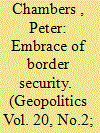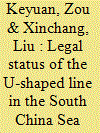|
|
|
Sort Order |
|
|
|
Items / Page
|
|
|
|
|
|
|
| Srl | Item |
| 1 |
ID:
138983


|
|
|
|
|
| Summary/Abstract |
Border security has become one of the key means by which the sovereignty and security of powerful nation-states is projected. This paper offers a set of observations of the Australian Commonwealth’s descriptions and instructions for its embrace of border security. Border security is legible here as a geopolitics that transforms the rights and responsibilities of maritime jurisdictions into a space of security that projects national sovereignty through the interdiction of boat arrivals. Its intensification as Operation Sovereign Borders is read as a further variation within national sovereignty, one that elevates the decisionist prerogative into total deterrence. Operation Sovereign Borders pushes the limits of sovereignty’s existence in the state toward a total domination of space, perception and human life in Australia’s maritime jurisdictions, in the name of the nation. This necessitates the development, defence and reinforcement of a regionally engaged materiality that is embodied, extended, enacted, and distributed. The intended effect of this coordinated effort is to secure the nation’s sovereignty as a unity, but the broader effect has been to devalue offshore life to secure onshore interests, in a way that now necessitates indefinite offshore detention.
|
|
|
|
|
|
|
|
|
|
|
|
|
|
|
|
| 2 |
ID:
137763


|
|
|
|
|
| Summary/Abstract |
The U-shaped line in the South China Sea has been recently challenged in the international community and this challenge reached its climax when the Philippines presented China with a Notification and Statement of Claim under Article 287 and Annex VII of the 1982 United Nations Convention on the Law of the Sea (LOS Convention) on 22 January 2013. In its Statement of Claim, the Philippines requests the Annex VII Arbitral Tribunal to adjudge and declare that China's maritime claims based on the U-shaped line are contrary to the LOS Convention and invalid. Against this background, this article will analyze the issues concerning the related submissions of the Philippines.
|
|
|
|
|
|
|
|
|
|
|
|
|
|
|
|
| 3 |
ID:
188727


|
|
|
|
|
| Summary/Abstract |
In this article, I argue that Malaysia joined the South China Sea dispute during the 1970s as a reaction to the World Oil Crisis instead of asserting historical claims as in the cases of Vietnam and China. Malaysia expanded its maritime jurisdiction to include several highly disputed maritime features at the height of the oil crisis. The crisis was initiated by an oil embargo imposed by the Arab states, which imposed domestic inflationary pressures on Malaysia's economy. These two factors, external and domestic, resulted in Malaysia's bolstering of its offshore hydrocarbon exploration and exploitation culminating in the expansion of its maritime jurisdiction. In particular, Malaysia expanded its maritime jurisdiction in 1976 and 1979, which coincidentally corresponded with the aftermath of major oil price hikes that occurred in October 1975 and December 1978. Compared to China, Vietnam, and the Philippines, all of whom issued their maritime claims on the South China Sea based on historical or new discoveries, Malaysia's expansion was a mere reaction towards the oil crisis rather than a deliberate move.
|
|
|
|
|
|
|
|
|
|
|
|
|
|
|
|
|
|
|
|
|